The Virtuoso Violinist, The Tall Mexican Conductor & The MIT Professor
Saturday, December 06, 2008
In my Friday NY Times I found this: In the preface to his only novel, "The Picture of Dorian Gray", Oscar Wilde famously proclaimed that "all art is quite useless." The statement seemed so intriguing to a contemporary, an Oxford University student named Bernulf Clegg, that in 1891 he wrote Wilde asking him where in his other work he "may find developed that idea of the total uselessness of all art."
Wilde, not directly answering Clegg's question, responded: "Art is useless because its aim is simply to create a mood. It is not meant to instruct or influence action in any way. It is superbly sterile, and the note of its pleasure is sterility."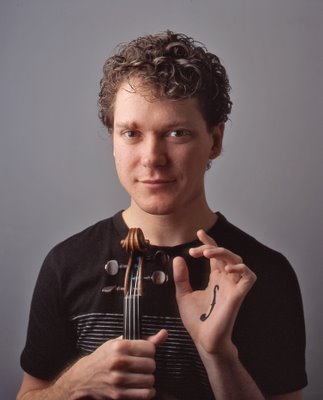 I would not agree at all and, furthermore, I am not qualified to equate art with culture. A statement on culture by an MIT professor (below) is more of my idea of the role of the arts and culture in society.
Amidst all the attention given to the sciences as to how they can lead to the cure of all diseases and daily problems of mankind, I believe that the biggest breakthrough will be the realization that the arts, which are conventionally considered "useless," will be recognized as the whole reason why we ever try to live longer or live more prosperously. The arts are the science of enjoying life.John Maeda Muriel Cooper professor of media arts and sciences at the Media Laboratory of the Massachusetts Institute of Technology. I first included Maeda's little gem here. I also wrote about the quaint and delightful Vancouver tradition of access here. This is after performance access, to the general public at backstages in theatre, ballet and opera, at the Queen Elizabeth, modern dance, the VSO at the Orpheum and if you are insistant (but not too agressive) even after performances at the Chan where one must navigate past large men dressed in black. I wrote about "that door" on stage right at the Orpheum in that link above. This last Monday Hilary ( my daughter and Rebecca and Lauren's mother) went through that very door to chat with violinist Corey Cerovsek. Nobody stopped us particularly since we didn't ask. The ghosts of other performers I have chatted or photographed back stage always haunt me ever so pleasantly. And there was Corey delighted to see us. "At one time legions of people would file in. Now this trend has almost disappeared," he told us. Cerovsek's two encores besides featuring a Bach violin sonata included an extremely difficult piece, a de force, I had never heard of. Cerovsek wrote down what it was for me.  The very tall (I calculate 6 ft 2 ) and very light-skinned Mexican guest conductor, Carlos Miguel Prieto (prieto means very dark-skinned), was there. He had directed the evening's performance of Verdi's Vespri Siciliani Overture, Sibelius (with Cerovsek as soloit) Violin Concerto in D minor op. 47 and Bartók's Concerto for Orchestra with lots of precision, great energy and with an obvious delight. Thanks to Prieto I discovered that indeed Bartók had a great sense of humor and was not the scary composer I thought he was. I chatted with Prieto and Hilary got to practice his Spanish with him. As Hilary and I left after such a pleasant evening I could not but recall Maeda's words: The arts are the science of enjoying life.Before that concert I had enjoyed Cerovsek's comment on the b+w version of the photo above which I placed here. Hello Alex!
With the computer perched a little precariously on the windowsill I pick up
a signal generously donated by the fine folks at the Safeway Credit Union...
fine and QUICK work there you've done! I find it's an excellent continuation
of the series. And not at all Hitlerjugend-y. (We'll await final word from
Lucy in Paris.) The more I look at this morning's picture, the more I enjoy
it... I'm visually tickled by the counterpoint of stability and motion in
the area around my hands. The solidity of the right hand leads one to the
frozen grace of the scroll of the violin, from which you trip over the
curves of the left hand with that F-hole dancing leaf-like in midair, down
the forearm to begin the loop again; my elbows hint at a triangle with the
center of my face, and for some reason it all makes me think of that classic
Escher drawing with the reptiles...
http://faculty.smu.edu/cwsmith/Escher_1.jpg
Harmony and melody in your composition. Very musical! It's almost as though
the spirit of juggling were silently in the air before my chest.
Three little comments. Lucy and I aren't actually engaged. (Marriage has
become quite passé in France, I believe.) My mother might be a bit shocked
to hear that we were. You have a typo on "preclude". And you might enjoy
knowing that Lucy and I have a purple magnet on our fridge quoting a line of
Thomas Beckett:
L'habitude est une grande sourdine
Waiting for Godot, I believe. Somehow perfect as it invokes the habit that
you write about while "sourdine" is what string players call the mute we
sometimes use... Lucy had the magnet before we met, so I think the latter
association is coincidental. But considering that a mute affords another
tone color to a player, and therefore to me has no negative connotation, it
suggests a cheerful interpretation: habit can also be a beautiful thing!
See you tonight,
Corey
Friday, December 05, 2008
Vivian: So you do get up, I was beginning to think you worked in bed like Marcel Proust.
Marlowe: Who's he?
Vivian: You wouldn't know him, a French writer.
Marlowe: Come into my boudoir.
The Big Sleep (Howard Hawks, 1946, with Humphrey Bogart as Marlowe, Lauren Bacall, as Vivian).

I lay on my back on a bed in a waterfront hotel and waited for it to get dark. It was small front room with a hard bed and a mattress slightly thicker than the cotton blanket that covered it. A spring underneath me was broken and stuck into the left side of my back. I lay there and let it prod me.

The reflection of a red neon light glared on the ceiling. When it made the whole room red it would be dark enough to go out. Outside cars honked along the alley they called the Speedway. Feet slithered on the sidewalks below my window. There was a murmur and mutter of coming and going in the air.

The air that seeped in through the rusted screens smelled of stale frying fat. Far off a voice of the kind that could be heard far off was shouting: “Get hungry, folks. Get hungry. Nice hot doggies here. Get hungry.”
-- Farewell, My Lovely (1940) Raymond Chandler
Moths Fluttering At My Kitchen Window
Thursday, December 04, 2008

These days as I look out the window of the guest bathroom or out the kitchen window (by the sink) I see little moths fluttering and trying to get in. It could be the light or the warmth they sense is on the other side of the window. They are insects at the end of their cycle.

They remind me of other animals I have seen in the throws of death. For all of us this is an exit we take alone, Hollywood scenes of Lionel Barrymore dying in bed surrounded by his loving family to the contrary. The fluttering of the moth's wings even reminds me of the little vibration in the body of a fighting bull moments before it dies on the sandy arena after it has been pierced by the matador's sword. In that huge arena of cheering people the 600kg bull seems small and pitifully alone. It dies surrounded by thousands of spectators. Is it any different to the shocking image of a dying crow in my garden as its wings like that moth's flutter and then stop?
Sow bugs and other bugs die by the thousands in my garden unseen, but those little moths hit home and sadden me. They are so persistent, trying to live for a few minutes or seconds more.
As the moths fade away I try not to go to the garden. The cold repels and the mush of my hostas as they fade into the ground is a sobering and unwelcome sight. But today I ventured outside anyway and I was rewarded by English Rose Coverdale. There were two blooms that had managed to open. And Rosa 'Ghislaine de Feligonde' while not in bloom sported beautiful new foliage that contrasted with the reddish older leaves. Those very leaves might have little holes next spring as the offspring of those little winter moths chew their way to an eventual confrontation with my kitchen window.

I momentarily forgot about my lonely moths but not forgetting that my own turn by the window in winter will come.
Cricket and Prorogation
Wednesday, December 03, 2008
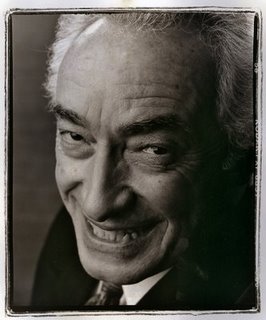 While I may be a Nationalized Canadian I have lived almost as many years as I have been in Canada in places like my native Argentina and my adopted Mexico. I am alien to the concept of a parliamentary democracy. My attempt to understand it has never gone past the concept of "losing confidence". On the other hand if parliamentary democracy is a British invention (English, perhaps?) how is it that the French and the Italians seem to have lots of governments going up and down with no-confidence votes. My concept of no confidence is simpler. 1. It can be a statement by a four-star general reading a decree, "Our country has lost all confidence in this government's ability to govern. We feel that unless we intervene to impose order our homeland will fall into chaos." 2. The simpler no confidence vote is a bullet in the head of the failing leader. As I grapple to understand what is happening to my Canada I have come to the conclusion that understanding politics of the parliamentary kind is no different from trying to figure out the rules (and even the purpose) of cricket. I often say that the French figured out their grammar after inventing wine (four times twenty plus six to say eighty six?) and the Germans did the same but with beer. My guess is that parliamentary democracy came to being during a primitive cricket game in which the players were tipsy on meade. As I read about a coalition of three parties and a possible prorogation I was confused by the term. I looked it up and found the English meaning to mean this in Wikipedia:
A prorogation is the period between two sessions of a legislative body. When a legislature or parliament is prorogued, it is still constituted (that is, all members remain as members and a general election is not necessary), but all orders of the body (bills, motions, etc.) are expunged.
In the British and Canadian parliamentary systems, this is usually due to the completion of the agenda set forth in the Speech from the Throne (in the UK, called the legislative programme, and also "the Queen's Speech"). Legislatures and parliaments, once prorogued, remain in recess until summoned again by the Queen, Governor General, or Lieutenant Governor, and a new session is begun with the State Opening of Parliament and the Speech from the Throne.My confusion lay in that in Spanish to "prorrogar" means to extend not to delay as in English. I looked it up in my RAE Dictionary and was surprised that while both the English and Spanish words come from the same Latin root, it is the secondary meaning in Spanish that is the same as in English which is to delay or suspend. But knowing that does not mean I understand parliamentary democracy any better. I remember taking the portrait of an interesting politician, Mel Hurtig(above, left) in 1993 who was heading the National Party. In elections that year Prime Minister Kim Campbell lost to Chrétien. Part of Hurtig's party platform is imbedded in my brain as he explained it to me in a most excited manner gesticulating with his hands as if here were a Latin American. It was this: An important platform in the National Party's campaign was the idea that electoral campaigns should be funded by individual Canadians each contributing a small amount each year, thus taking away what the National Party considered was the undue influence of large, multinational corporations funding political campaigns.For years after I kept receiving mail from Hurtig. I have always remembered him fondly as a good man, no better and no worse that some of the other Canadian politicians that have faced my camera. But I suspect that he would not have approved of any of the current shenanigans. But whatever these shananigans will bring I am now, confidently, a Canadian and I know there will be no bullet to anybody's head. Below is part of Chapter One of one of Patrick O'Brian's Aubrey/Maturin novels, The Fortune of War . It is about a cricket match played by Captain Jack Aubrey, R.N. and his crew of the Leopard against the Admriral Drury's Cumberlands on the port of Pulo Batang in the Dutch East Indies in 1812. The match is initially won by the Cumberlands but in the end an inexperienced Doctor Stephen Maturin (Captain Aubrey's surgeon and a great Irish hurler) saves the day. Most of the chapter is alien to me and I have never understood exactly how it is that Doctor Maturin comes to save that day! The match began precisely on the hour, by Admiral Drury's watch: Jack won the toss, and elected to go in. The game was democratic, to be sure; but democracy was not anarchy; certain decencies were to be preserved; and the Captain of the Leopard , with his first lieutenant, led the way, while the Admiral opened the proceedings, bowling downhill to Babbington. He took the ball from his chaplain and polished it for a while, fixing the lieutenant with a steely glare; then taking a skip, he bowled a wicked lob. It pitched well up outside the off stump, and Babbington played back, but as he played, so the ball broke in towards his vitals, and jerking back further still he spooned the ball neatly into the Admiral's hands, to a roar of applause from the assembled Cumberlands.'How is that?'said the Admiral to the chaplain.
'Very pretty, sir,'said the chaplain. 'That is to say, Out.'
Babbington returned, downcast. 'You want to watch the Admiral,' he said to Captain Moore, of the Leopard's Marines, who succeeded him. 'It was the most devilish twister you ever saw.'
'I shall play safe for the first hour or so, and wear him out,' said Moore...The Leopards are losing so Midshipman Forshaw comes to summon Stephen Maturin who is working in a nearby hospital: 'Oh pray sir, come on, 'cried Forshaw over his shoulder. 'The Admiral is skipping up and down: and we are in a dreadful way. Mind the branch, sir. Nine wickets down, and only forty-six. Mr. Byron got a duck, and so did old Holles.'...
...Jack [Aubrey]came to meet him, and said in a low voice, 'Just keep your end up, Stephen, until your eye is in; and watch out for the Admiral's twisters,' and then as they neared the Admiral, 'Sir, allow me to name my particular friend Dr. Maturin, surgeon of the Leopard.'
'How d'ye do, Doctor'?' said the Admiral.
'I must beg your pardon, sir, for my late apperance; I was called away on-'
'No ceremony, Doctor, I beg,' said the Admiral, smiling: the Leopard's hundred pounds were practically in his pocket, and this man of theirs did not look very dangerous.
'Shall we begin?'
'By all means,' said Stephen.
'You go down to the other end, 'murmured Jack, a chill coming over him in spite of the torrid sun.
'Should you like to be given a middle, sir?' called the umpire, when Stephen had walked down the pitch.
'Thank you, sir,' said Stephen, hitching up his waistband and gazing round the field, 'I already have one.'
A rapacious grin ran round the Cumberlands: they moved much closer in crouching, their huge crab-like hands spread wide. The Admiral held the ball to his nose for a long moment, fixing his adversary, and then delivered a lob that hummed as it flew. Stephen watched is course, danced out to take it as it touched the ground, checked its bounce, dribbled the ball towards the astonished coverpoint and running still he scooped it into the hollow of his hurly, raced on with twinkling steps to mid-off, there checked his run admist the stark silent amazement, flicked the ball into his hand, tossed it high, and with a screech drove it straight at Jack's wicket, shattering the near stump and sending its upper half in a long, graceful trajectory that reached the ground just as the first of La Fleche's guns, saluting the flag, echoed across the field.
Anosh Irani's Father's Fiat
Tuesday, December 02, 2008
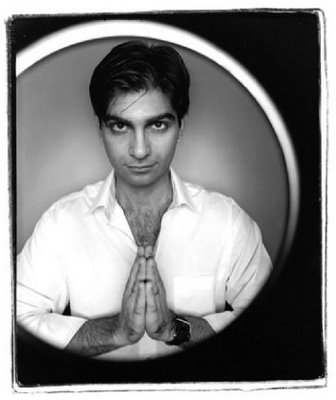
Friday night, I was driving to the Vancouver Dance Centre. CBC's As It Happens was on the radio and they were interviewing Mumbai-born Vancouver author and playright Anosh Irani. I have photographed Irani and I have sat next to him at the theatre. I can attest to the fact that he is a gentle and quiet spoken man. He was talking to the folks at the CBC from his home. He was working on his next novel so the reporter (Carol Off, perhaps?) inquired if he was going to insert the situation in Mumbai in his novel. Irani answered that he was working on a journalistic piece (the essay below, perhaps?) and that he was having a hard time grappling for objectivity and trying to supress his emotions. He stated that this was most important. Did he succeed?
Flowers for the Taj
By ANOSH IRANI
Mumbai, India
As I watched the Taj Mahal hotel breathe fire, I remembered my grandfather, Burjor. For more than 30 years, he was the florist at the hotel, ordering roses flown in daily from New Delhi.
Like the Taj, his black Fiat, a broken dinosaur of a car, was a landmark in itself. Filled to the brim with cane baskets for his flower shop, and home to several brown cockroaches, he parked it in the same spot every day — right in front of the hotel’s main entrance.
I essentially grew up in the hotel. And I would have been there on Wednesday night, browsing in its bookshop, and at the Leopold Cafe nearby, if it were not for the last-minute distraction of a soccer match in my neighborhood.
My family lives about 4 miles from the Taj, in a Parsi colony called Rustom Baug. The colony was developed exclusively for members of the Zoroastrian religion — the same religion that J. N. Tata, the man who built the Taj, belonged to.
It is one of the quietest and most picturesque locations in Mumbai. It can feel like it’s a world away from the city. Except when it’s not, like when the attacks started.
The morning after the siege began, I read the following story in one of the papers:
Moments before the terrorists opened fire in the main lobby of the Taj, a 10-year-old boy had entered the hotel to use the washroom. When he heard the shooting, he stood paralyzed in the center of the lobby until a man whisked him away and they hid in Nalanda, the bookshop in the Taj. They switched off the lights and sat in the darkness for nearly three hours.
There was a time, not so very long ago, when I could have been that boy. Nalanda is my favorite bookshop in Mumbai. My grandfather took me there every Sunday when I was a boy. While he cajoled me into buying books on science — though he was a florist, nuclear physics was his passion, and he was also fluent in Japanese — I sheepishly picked up copies of the Tintin and Asterix series as well as Amar Chitra Katha comics, full of fables and magnificent illustrations of demons and celestial beings from Indian mythology.
Thankfully, the boy’s story, like the Amar Chitra Katha comics, had a fairy-tale ending. He was reunited with his parents.
On Saturday, when the siege ended, I stepped outside our gates and took a taxi to the Taj. The driver let me off nearby at the Regal Cinema and I walked toward the Leopold Cafe. The smell of disinfectant was overpowering. The cafe was closed, but through the shutters I noticed that two ceiling fans were on. There was a flier on the outside wall with “Good News” written on it, an advertisement for plumbing and carpentry.
The makeshift stores selling old gramophones were empty. A store called R. Dadavji’s Ladies and Gents Under Garments was open. Florists also were open because a tragedy like this always means business. But everything else was closed. I came in view of the Taj’s entrance and the spot where my grandfather’s black Fiat was always parked. There was a police barricade flanked by fire engines. The hotel’s windows had been smashed, like teeth that had suddenly gone missing. Above, crows circled.
I thought of all the weekends when I would come to the Taj bookstore with my grandfather. I thought of how for so many years he bejeweled the hotel’s rooms with flowers. Today, I thought, his store would be closed. The last thing he would have wanted would be to use his flowers to decorate the dead.
Anosh Irani is the author, most recently, of “The Song of Kahunsha.”
The New York Times, Tuesday December 2, 2008
I agonized a bit about posting Irani's essay instead of placing a link to the NY Times. Most people are perhaps a bit lazy about getting the free access to the NY Times on line and the link would not open for those people. It is such a shame for Vancouverites not to see good local writing in international publications. I consulted with my friend Christopher Dafoe (expert in litigation, media and defamation), associate at a prominent local law firm. He told me with that pleasant calming voice of his, "Alex the NY Times have bigger fish to fry. I would not worry. At the most if they ever find your blog they will tell you to take it down."
When possible I like to write my own blog stuff. I don't want to be an aggregator (what an ugly word!) which seems to be an exploding business. Our local aggregators seem to stress food, the Canucks and the BC Legislature in somewhat that order. I don't have the heart to comment on the food ones that it is very difficult to make food appetizing and that is why we used to have professional food photographers. My friend John Lekich might not agree with me when I can say one can fudge with writing but not with food photography. For the latter you have to know what you are doing.
Corey Cerovsek - The Sequential Violinist
Monday, December 01, 2008
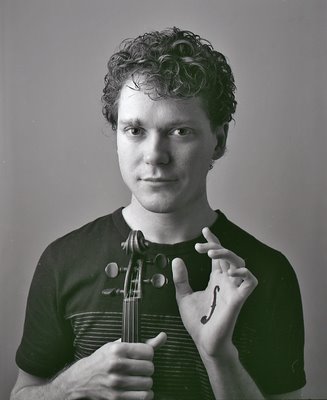 In Saturday's fine Eugene Onegin both Tatyana's mother and nurse say: Habit is sent to us from above in place of happiness. I would agree with that stament yet I can see some exceptions. Here is one. I knew I was going to be taking Corey Cerovsek's photograph today as a very pleasant routine or habit that started in 1987. I am fascinated by taking pictures of people, over and over as one can see time at work. In the case of Cerovsek you can see the boy become a man. 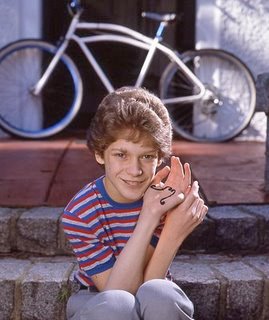 The Onegin quote on habit made me think of Malcolm Parry who once (around 1987) disgustedly told me, "Alex, you are not taking good pictures anymore. You are just making the motion." I was extremely angry and insulted even though Parry may have been right. I have never forgotten his disdain and I have always tried to do my best photographically and to somehow not lose my passion for it. I don't habitually smell my roses every spring. To me in spite of the memory of their scent in my head the experience is a first-time-again one. 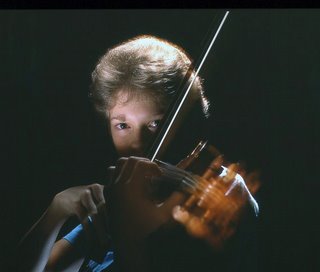 Since 1987 I have photographed violinist Corey Cerovsek 6 times. The first time and the second time where in that first year. The folks at Saturday Night wanted me to capture the "devil behind his genius". This I did in my old studio in Yaletown. The second shot was in the back yard of a friend and sponsor of Cerovsek. The bicycle was there (not his) and the T-shirt was mine. I wanted to convey for Vancouver Magazine the fact that the 14-year-old Cerovsek was really, first, a boy. 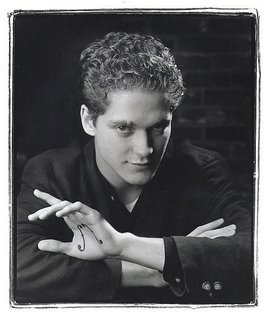 The third very elegant shot I took in a Yaletown beer parlour. As we left I remember Cerovsek saying, "I wonder what would have happened if I had forgotten my violin case that was under the table on the floor. After all it is a ....million dollar Strad." In other years it became fun to find some way of making the picture slightly different for laughs. In 2006 I used a ring flash and a wideangle lens. There was a slight problem with that series as Corovsek's fianceé in Paris (both live in Paris) thought the raised hand looked to much like a Hitler-Jugend salute. 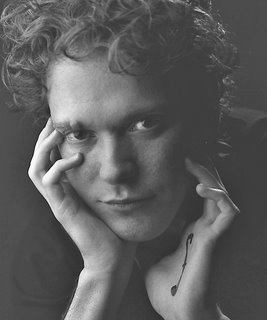 This year, this morning to be accurate, I decided to incorporate just a bit of that ...million dollar Strad. There are no other tricks, no wide angles or weird lighting. Here you see Corey Cerovsek at age 36. 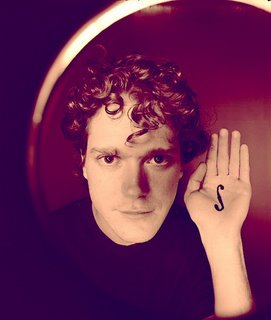 Tonight Rebecca's mother Hilary (Rebecca is not allowed to go anywhere cultural during the week, or much of the rest of it) and I will be listening to Cerovsek play the 1903 Violin Concerto in D minor, opus 47 by Jean Sibelius. After the concert, at the Orpheum with the Vancouver Symphony Orchestra, we will go back stage for a visit. 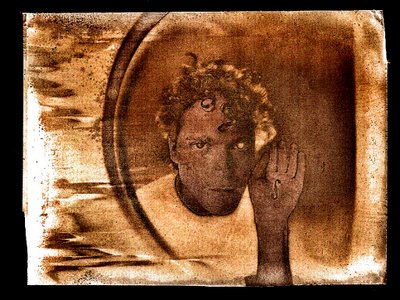 Habit does not always preclude happiness!
A Surprising Eugene Onegin Lures Me For Carmen In Spades
Sunday, November 30, 2008
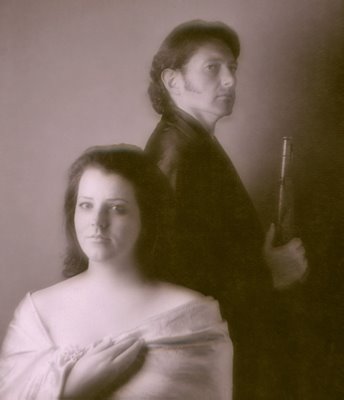 For some services rendered I had two extremely good tickets to the Vancouver Opera's opening day performance, last Tuesday, of Pyotr Iliych Tchaikovsky's opera Eugene Onegin. But I took a chance and asked the powers that be for lesser (but three) tickets for yesterday Saturday with the idea of also taking Rebecca. I asked Rebecca. She said yes. But later it came down that she had been afraid to say no and that she really did not, nor does she like opera. My only comment on this is that you need yeast back at the bakery to make dough rise and without yeast, bread will always be flat. The empty seat besides me was like a black hole. I could feel a pull. Rosemary and I from the vantage point of our lesser ticket seats enjoyed an opera that surprised me at many levels. The sets (Neil Patel) were sparse and beautiful especially the one in Act III where a bored Eugene Onegin (baritone Brett Polegato) comes back from a trip around the world where all he has found is more boredom. Servants remove his travel clothing and dress him up for a ball as the scenery around him transforms itself into a neo-Greco-Roman ballroom with huge columns bathed in a metalic blue cast. The dancers appear and then Tatyana (soprano Rhoslyn Jones) makes her triumphant entrance lit by a brilliant warm spotlight and in the arms of the tall soldier husband, Prince Gremin (bass Peter Volpe). I have not been so moved by colour and lighting (Rui Rita) in a very long time and particularly in theatre or opera. The music was also a surprise, while being romantic, it was somehow also sparse, elegant and less over the top as in some of the Italian operas. The overture was quiet and short. The endings after each act (3) or scenes (7) were probably also quiet and lovely but last night's audience was quick to clap before the music ended so I was left with a frustrating curiosity. The music was a revelation which somehow matched the look of the sets and the crisp sound of chorus director Leslie Dala's chorus. Could it be an accident that if Tchaikovsky has given us so many good ballets that the dancing in this production (Allison Grant, choreographer) was both interesting and fun? As always Rosemary and I enjoyed the Preacher of the Opera's sermon (even the folks at the unculturally recalcitrant Vancouver Sun know a good thing when they see one as they now sponsor the pre-opera talks) before the night's opera. Doug Tuck (The Preacher) enlightened us on how the composer was inspired by Russian composer Mikhail Glinka's opera Ivan Susanin and Pushkin's own Eugene Onegin . At the end of his talk he informed us of the Vancouver Opera's next production, which is Bizet's Carmen which opens January 24, 2009. I wondered if Tuck was up to something and if he was somehow winking at us. When we arrived home I looked into my The History of Opera by Richard Sommerset-Ward and hit paydirt! But it was in Paris (1876) en route to Bayreuth that he had what he himself described as his most important experience. He attended a performance of Bizet's Carmen. It had been staged for the first time the previous year and had had a cool reception from the Parisian audience. What fascinated Tchaikovsky was not just the copious melody and the realistic story line: Carmen also had an underlying theme that corresponded to something deeply embedded in his own consciousness and, that was increasingly to dominate the remaining years of his life - the theme of fate.
In the "Card Trio"at the beginning of Act III, Carmen turns over the cards to see how they lie. "Spades - a grave!" she exclaims. "What matters it? If you are to die, try the cards a hundred times, they will fall the same - spades, a grave."In Onegin's duel scene in Act II Scene 2, Oengin's former friend Vladimir Lensky (tenor Oleg Balashov) sings beautifully of his fate and his possible grave in very much the same words. While one of Tchaikovsky's lesser known operas, The Queen of Spades was based on a Puskin own story by the same name he cannot have written it without thinking back to Carmen's prophecy.
|
























